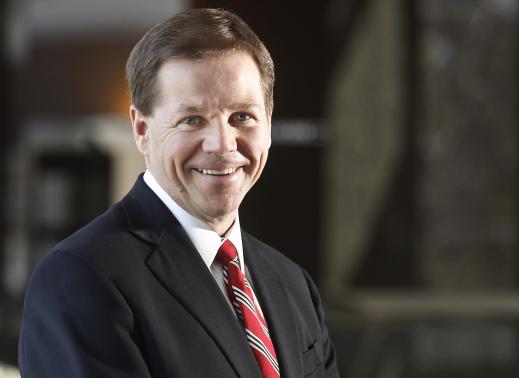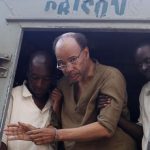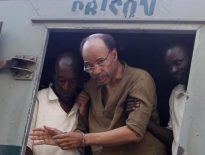(Reuters) – Before attorney David Wasinger decided to take on two of the biggest global banks in federal court in New York, he had visited the city just twice: once when he was 6, and the second time on a tour bus with his children.

REUTERS/Sarah Conard (UNITED STATES – Tags: BUSINESS)
As the sole partner at a five-attorney firm in St. Louis, Missouri, Wasinger was mostly focused on local business litigation and had never represented a whistleblower.
But in January 2012 an old business acquaintance was ready to go public with accusations of widespread mortgage fraud at Bank of America’s Countrywide unit, and he turned to Wasinger.
That touched off a series of events that put Wasinger at the center of two of the biggest legal cases to emerge from the 2007-2009 financial crisis, against Bank of America andJPMorgan Chase & Co, respectively.
In January, the U.S. Attorney’s office in Manhattan said it is seeking up to $2.1 billion in penalties from Bank of America after a jury in October found the firm liable for fraud over defective mortgages sold by Countrywide. Wasinger’s client, former Countrywide Executive Vice President Edward O’Donnell, was the star witness for the prosecution.
And earlier this month, JPMorgan Chase agreed to pay $614 million to settle claims that it defrauded the U.S. government by submitting sub par home loans for federal insurance. The case relied in part on evidence provided by another Wasinger client.
We’ve been very, very fortunate, Wasinger, 50, told Reuters in an interview. I am just a country lawyer from Missouri trying to hold Wall Street accountable.
It has not been determined how much money Wasinger’s firm or his clients will receive. Typically, a whistleblower who exposes fraud against the government can receive 15 percent to 25 percent of the settlement, though a court can cut the award depending on how much the person contributed to the case and other factors.
Experts say Wasinger’s payout from the JPMorgan case could reach into the millions of dollars, an amount that would be a windfall for his relatively modest firm. His potential gains from the Bank of America case would likely be much smaller, as that case was tried under a law that limits whistleblower recoveries. Wasinger declined to comment on possibleearnings.
Representing whistleblowers is a lucrative business for lawyers and is hyper competitive, since few corporate insiders who come forward actually have the information that leads to big government lawsuits. What makes Wasinger’s situation unusual is that he stumbled into the field.
A CALL FROM A FRIEND
Wasinger grew up two hours north of St. Louis in Hannibal, Missouri, an agricultural community of 18,000 people that is famous for being Mark Twain’s hometown. He earned his law degree from Vanderbilt University in Tennessee in 1988, and worked for a short time at a large regional firm in St. Louis.
In 1991, Wasinger joined a small law firm with a colleague that has morphed into the Wasinger Law Group. His wife, Colleen, is also an attorney at the firm, which handles real estate litigation and partnership disputes, among other local business matters.
It is a small but busy practice, according to Wasinger, who said he typically worked 40 to 50 hours a week. The Bank of America case took him to a whole new world of high-pressure New York trials and 90- to 100-hour work weeks.
Prior to that case, Wasinger had never before worked on litigation involving the False Claims Act, the law that allows whistleblowers to collect rewards if they disclose fraud against the government. But Wasinger had known his client for years, having represented another company O’Donnell worked at in an unfair competition case in the 1990s.
In February 2012, Wasinger filed a sealed case against Bank of America on behalf of O’Donnell, who accused Countrywide of selling thousands of shoddy mortgage loans to the government-controlled Fannie Mae and Freddie Mac.
Wasinger said he decided to file the suit in New York as the local U.S. Attorney’s office did not have much experience with financial fraud cases. He drafted the complaint and traveled to the Big Apple, his third visit.
He is a very dogged and determined lawyer, said Heidi Wendel, who dealt with Wasinger when she was a lawyer in the civil frauds unit at the Manhattan U.S. Attorney’s office. She is now in private practices at the law firm Jones Day.
He drafted a solid complaint that could get the government’s foot in the door, Wendel said, referring to the Countrywide lawsuit.
Wasinger also filed a similar complaint with the Justice Department under another law, the Financial Institutions Reform, Recovery, and Enforcement Act (FIRREA). Then he waited.
In October 2012, the Justice Department joined O’Donnell’s lawsuit. Bank of America decided to fight it, and the trial took four weeks with O’Donnell as the primary witness.
It was a much larger trial than any cases Wasinger had been involved with, and one he described as intense and stressful. The government’s Countrywide trial team would often stay in the office until midnight or 1 a.m. One Justice Department lawyer slept on an air mattress in the office after his home was damaged by Hurricane Sandy.
Wasinger said he was often daunted by the army of Bank of America lawyers that would pull up to court each morning. It was like a presidential motorcade, he said. Meanwhile, DOJ doesn’t even have a coffee pot in their office.
The government and Bank of America are waiting for a judge to determine the bank’s penalty. A spokesman for Bank of America, headquartered in Charlotte, declined to comment. A spokeswoman for the U.S. Attorney’s office also declined to comment.
A CALL FROM A STRANGER
After the Bank of America case became public in October 2012, Wasinger said he received dozens of phone calls from people claiming to be whistleblowers.
Most of their tales of corporate fraud were not credible, he said, and turned them away.
One of the callers was Keith Edwards, a former supervisor in JPMorgan’s government insuring unit in Louisiana. Edwards told Wasinger he had been pushed aside when he tried to improve the quality control of loans submitted for insurance to the Federal Housing Administration or the Department of Veterans Affairs.
After hearing so many similar claims, Wasinger was skeptical. You’ve got a lot of good lawyers in Louisiana, he told Edwards. If Edwards was serious, Wasinger added, they would have to meet.
Edwards drove through the night to St. Louis from Monroe, Louisiana, a nine-hour trip. He was impressed with Wasinger after their initial conversation, Edwards told Reuters via email.
In January 2013, Wasinger filed his second False Claims Act case, this time against the largest U.S. bank, on its home turf.
The U.S. Attorney’s office was already deep into an investigation into JPMorgan’s mortgage-lending practices. Edwards provided the government with new information, including about VA loans. Instead of litigating the case, as Bank of America had, JPMorgan decided to settle.
A JPMorgan spokeswoman declined to comment beyond its previous statement that the settlement represents another significant step in the Firm’s efforts to put historical mortgage-related issues behind it.
NO PAYMENT YET
Wasinger has yet to be paid for the two cases that he spent much of the past couple of years working on.
The government and Wasinger are currently negotiating Edwards’ share of the JPMorgan deal. Under the False Claims Act, he can theoretically earn up to $150 million, but is likely to get less than that because the government had already conducted some of the investigation into JPMorgan prior to his complaint.
In the Countrywide case, although O’Donnell was a key witness, his payment is capped at $1.6 million under FIRREA because the False Claims Act portion of the suit was dismissed prior to trial. O’Donnell may be able to collect more money if he appeals that ruling.
Wasinger said he will get a cut of what his clients are awarded, but declined to give details.
The percentage that a lawyer for a whistleblower gets varies widely, but a general rule of thumb is 33 percent to 40 percent, according to Stephen Kohn, executive director of the National Whistleblower Center, a non-profit group that advocates for whistleblowers.
There have been only about 25 large cases – more than $200 million – in three decades’ worth of False Claims Act prosecutions, he said.
In one of the largest payouts ever, a former quality manager at GlaxoSmithKline Plc won $96 million in October 2010 for exposing manufacturing defects at a plant in Puerto Rico. The drug company paid $750 million to settle the charges.
As Wasinger awaits payment, he and his firm have continued to work on their usual stable of local business litigation. Wasinger said he has no plans to seek out whistleblowers as clients but could represent another if the case was right.
The attorney said he wants some time to decompress. He has had to travel to New York frequently in the past two years, but spent most of his time in conference rooms and the courtroom. With each visit to the U.S. Attorney’s office in downtown Manhattan, he has enjoyed watching construction progress on One World Trade Center and the 9/11 Memorial.
Once he gets paid, Wasinger said he plans to spend some of the money on his sons: Alex, who just turned 12, and Andrew, who is 10.
I’m taking them to New York City, Wasinger said.
(Reporting by Aruna Viswanatha in Washington; Additional reporting by Nate Raymond in New York; Editing by Karey Van Hall, Tiffany Wu and Doug Royalty)





